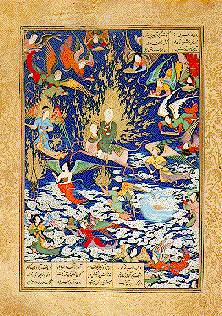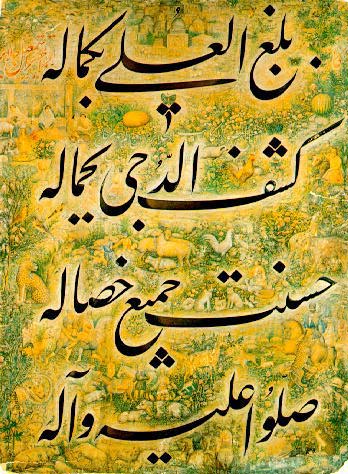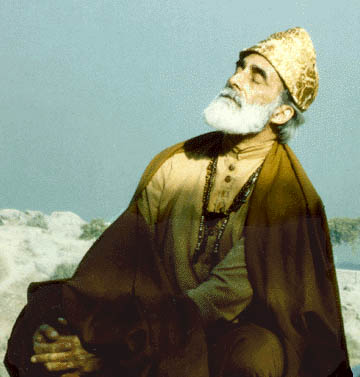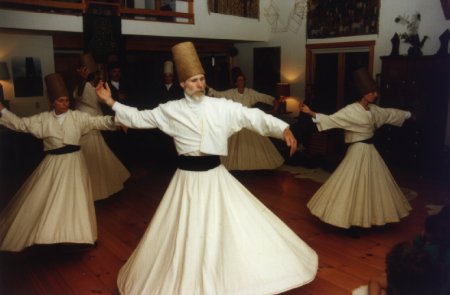 |
Encountering a Sufi master Wednesday January 24th January 25th,
Thursday night: invitation to Omid’s home. How does studying a religious
tradition Monday, January 29th |
 |
Schedule of Classes & Reading Assignments
(All readings on given days are to be completed before you come to class.)
Stations on our path, insha’Allah (God-Willing)
Monday, Jan 22th:
Introduction/initiation
* Intro class: the importance of dhawq,
"experience/taste"
 |
Encountering a Sufi master Wednesday January 24th January 25th,
Thursday night: invitation to Omid’s home. How does studying a religious
tradition Monday, January 29th |
 |
Defining "Sufism" and the problematic of the "Mystical"
| Wednesday, January 31st.
Sufism and the problematic of "the mystical" * A. Schimmel: "What is Sufism?" and "Historical Outlines of Classical Sufism", in Mystical Dimensions of Islam, pp. 3-98. * James Morris, "Situating Islamic ‘Mysticism’: Between Written Traditions and Popular Spirituality", pp. 293-334. * Nicholson, "Origin and Development of Sufism", pp. 330-348.
( Assignment:
Based on what you have seen so far, how would you
translate the term tasawwuf ? Monday, February 5th: The the
mystical Path (tariqat)
|
 |
The Foundational Sources of Sufism:
Qur’an and the barakaof Muhamamd (S)
Wednesday, February 7th, Centrality of the Qur’an
* Michael Sells, Early Islamic Mysticism, pp. 29-46, 75-96.
* Carl Ernst, Teachings of Sufism, "Mystical Understanding of the Qur'an", 1-14extra material:
*For some information on Sufi exegesis of the Qur’an, also see
www.arches.uga.edu/~godlas/Sufism.html#Sufi Qur'an Commentary* For a Sufi interpretation of the Opening chapter of the Qur’an,, see
www.arches.uga.edu/~godlas/ruzguide.html( Assignment: Discuss the Sufis’ relationship to the Qur’an, particularly in terms of their hermeneutics.
How do they access different layers of meaning in the holy text?)
| Monday, February 12th:
The example of the Prophet, and Heavenly Ascension
(Mi'raj) * Michael Sells, Early Islamic Mysticism, pp. 47-75. * Ernst, Teachings of Sufism, "The Character of the Prophet Muhammad", 15-39 To get a sense of the love
for the Prophet in practice, see: * See the following web-site
associated with the Mi'raj: The poem to the right is by the Persian poet, Sa'di, in honor of the Prophet.. This poem, in Arabic, is sung all over the Muslim world. Balagha 'l-ula
bi-kamlalihi "He reached
hights of perfection
|
 |
| Wednesday, February 14th:
Early Sufi theorists: *Sells,
"Qushayri" and "Sarraj", in Early
Islamic Mysticism, p. 97-150,
196-211. |
Dhikr: Monday, February 19th: * For some more information on
dhikr/zekr, see * Music: Bosnian zekr, Turkish zekr. |
 |
Pir Vilyat Khan, in meditation. Ajmer, India, Circa 1979. |
Wednesday, February 21st:
* Ernst, Teachings of Sufism, "Divine
and Human Love", p. 82-94,
Teachings of Sufism, "Lives of the Saints", p. 170-200
* Music: man dard-e to-r ze dast sn
nadaham; by Shahram Nazeri
Sufi
Aesthetics: |
 |
| Monday, February 26th: Ernst,
Teachings of Sufism, "Listening to
Music", p. 95-117 * check out web page: See here for the rulings of al-Ghazali on music. |
Tuesday, February 27th, 5:30 at the Hall of the Presidents Mandatory
Sufi Concert, Attendance
Required. |
Wednesday, February 28th:
Seemi Ghazi speaks in class, about experiences as a Sufi and as a
woman.
Readings: Sells, Early Islamic Mysticism, "Rabia",
pp. 151-170.
* Music: Zuleikha, featuring chanting of the
names of significant Sufi women.
* Web: www.arches.uga.edu/~godlas/Sufism.html#Rabi'a
along with:
http://www.arches.uga.edu/~godlas/Sufism.html#Sufi
Women
( Assignment: In looking at Rabi’a, how is she a woman Sufi?)
Thursday, March 1st Colgate Chapel 4 pm Recitation of the Qur'an by Seemi Ghazi. |
Monday, March 5th
* The feminine and Sufism
* V. Hoffman, Sufism, Mystics, and Saints
in Modern Egypt, ."Women and Sexuality in Sufi Life and
Thought", pp. 226-254.
Guest lecture by Sa'diyya Shaikh.
* Camille Helminski’s article on Sufi women:
http://www.webcom.com/threshld/society/articles/women.html
* On Sufi women, see
http://www.ias.org/swo/
Tuesday, March 6th 11:30 Brown bag
lunch with Sa'diyya Shaikh 4 p.m.
talk by Sa'diyya Shaikh on |
Wednesday, March 7th,
Ecstasy unleased:
* M. Sells, "Bistami" and "Hallaj ", Early
Islamic Mysticism, pp. 212-251, 266-281.
* Also refer to:
March 10th-March 18th Spring Break
Your friendly little writing pleasure, a.k.a. "midterm" Dear friends... Be at ease about this writing
opportunity. There are, in most cases, some points
that I want you to address. The total for the whole assignment
should be around 10 pages. Question one: We have so far in this class presented
Sufism as a spiritual path, What do the Sufis get from the Qur'an? How do the Sufis relate to Prophet
Muhammad? Question two: We have, during the course of the
semester, spent much time talking about the
"path" and stages and stations on the path. What I want you to do for this segment
is far more challenging The tone and flow of what you write is
significant. For this question, be sure to use Love is Wine, Mystical Dimensions of Islam, Early Islamic Mysticism, and Teachings of Sufism For both questions, be sure to breathe, and again, be at peace.... If you have been coming to class and
keeping up with (let's be honest: not all, but most?) of
the readings, |
The Sacred Psychology of
Sufism:
The mystical levels of the self.
Monday, March 19th:
Frager, Heart, Self, & Soul, Chapters one-three p.
1-94
Wednesday, March 21st:
Frager, Heart, Self, & Soul, Chapters 4-6, pp.
95-186
* James Morris, "Listening for God:
Prayer and the Heart in the Futûhât", [available
through www.ibnarabisociety.org/morris.html ]
Monday, March 26th:
Frager, Heart, Self, & Soul, Chapters 7 & 8, pp.
187-235.
Ernst, Teachings of Sufism, "Mastery and Discipleship",
pp. 148-169.
In class lecture by Prof. Jamal Elias, of Amherst College,
insha'allah.
The Life of a Sufi:
The hagiography of Shaykh Abu Sa'id b. Abi 'l-Khayr
March 28th:
Ebn-e Monavvar, The Secrets of God's Mystical Oneness,
pp.: 61-133
* Music: Allh, Muhammad Chahar Yar, ....(Nusrat
Fateh Ali Khan)
April 2nd: Ebn-e Monavvar, The Secrets of God's Mystical Oneness, pp.: 133-201
April 4th: Ebn-e Monavvar, The Secrets of God's Mystical Oneness, pp.: 201-297
April 9th: Ebn-e Monavvar, The Secrets of God's Mystical Oneness, pp.: 297-365
April 11th: Ebn-e Monavvar, The Secrets of God's Mystical Oneness, pp.: 365-427
Monday, April 16th:
Ebn-e Monavvar, The Secrets of God's Mystical Oneness,
pp.: 427-495
Film in class: Film: Door to the Sky
Sufism in the contemporary world:
The case of Sufism in modern Egypt.
Wednesday, April 18th:
V. Hoffman, Sufism, Mystics, and Saints in
Modern Egypt, Chapters
1, 2, 4 (pp. 1-49, 89-123)
Film: Door to the Sky
Monday, April 23rd:
V. Hoffman, Sufism, Mystics, and Saints in
Modern Egypt,Chapters
5, 7, 9, (pp. 123-155, 196-226, 255-299)
browse through: * Annemarie Schimmel,
"Sufi Orders and Fraternities", Mystical Dimensions
of Islam, pp. 228-258.
Film in class: I am a Sufi, I am a Muslim
Wednesday, April 25th:
V. Hoffman, Sufism, Mystics, and Saints in
Modern Egypt,
we will discuss in class chapters 1, 2, 4, 5 of this book today
(reading p. 1-49, 89-155).
Monday, April 30th:
We will discuss today the following chapters of the book today:
7, 9, 10, 11, 12 (pages 196-226, 255-299; 300-377)
Wednesday, May 2nd:
Rumi: The Path of Love
( Assignment: In your opinion, what does Sufism have to offer the world? Is its message exclusively available to Muslims? If so, why? If not, why? What does all this imply for boundaries between religious traditions?
Return To Main page for Religion 337
Return to Omid Safi's Main Page.